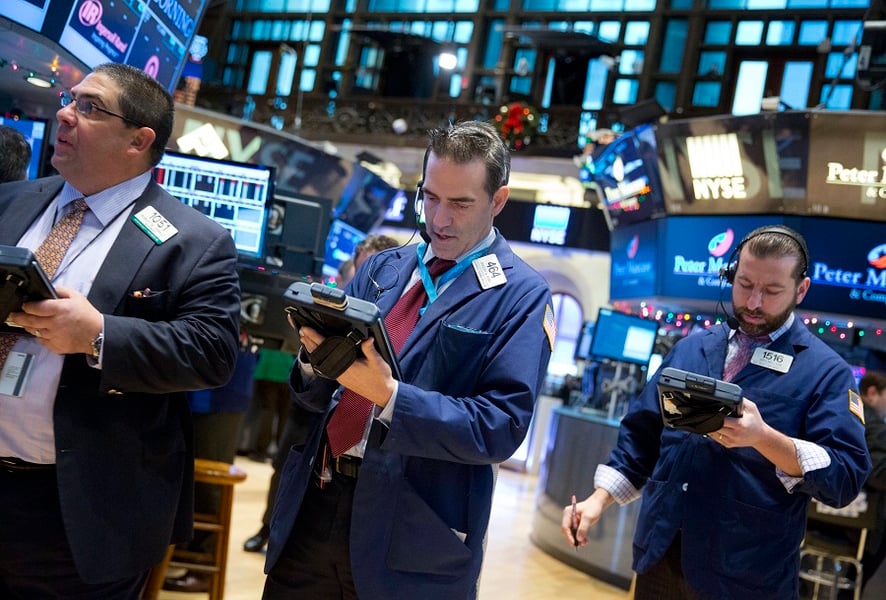Some say the market is overreacting to bad news — but what if it's not?
Prices bounce around, emotion obscures logic, signals appear and vanish. The reasons for treating equities as a poor barometer for the economy are many. Right now, that might be for the best.
Pools of gloom await anyone looking for a message in stocks. There's the $3 trillion in value erased, the bloodbath in banks and the trouncing in transports. In wonkier circles, shrinking valuations and negative rolling returns have started to ring the recession bell. A relatively calm week in the Dow Jones Industrial Average just ended with a 495-point thud.
It's a pastime on Wall Street these days to look at the carnage, add it all up, and announce that the market is wrong. But what if it's not? After all, even if equities have predicted "nine of the last five recessions," as the economist Paul Samuelson famously said, that's a better record than a lot of humans.
"I usually come down to the side of the market, because the market represents the collective views of a tremendous number of investors," said John Carey, a fund manager for Amundi Pioneer Asset Management in Boston. "The market can be wrong, but I never dismiss it out of hand."
As of Friday's close, the S&P 500 was down 11.3% from its September close, with more than half its constituents nursing bear-market losses of 20% or more. The Nasdaq 100 has fallen 13.9% from its record close in August, while the Russell 2000 Index of small-cap stocks has lost 19%, leaving all three with declines for 2018.
Make no mistake: the pros say the sell-off doesn't mean much. Looking at the S&P 500's downward trajectory over the last 12 months, David Kostin, Goldman Sachs's chief U.S. equity strategist, reckons the market is pricing in zero economic growth. That's too pessimistic, he said, as the firm sees a 2.5% expansion next year.
Robert Buckland, Citigroup's chief global equity strategist, employed a similar approach in assessing the future of corporate profits. The MSCI World All-Country Index is now pricing in a 1% decline in earnings in 2019, below the 5% increase that he and his colleagues forecast.
"Our models suggest that global equity may now be too bearish on the earnings outlook," Mr. Buckland wrote in a note Thursday. "This suggests investors should buy the dip."
Fair enough, but each time the sell-off deepens, the implications get a little harder to shake off. Take forward valuations and the idea that market's price-earnings ratio embeds an estimate for next year's profits. Since Bloomberg began tracking the data in 1992, the S&P 500 at this time of year has stood at an average of 17.4 times income that ended up materializing in the next year.
Assuming stocks are now valued at that average, it would equate to the market predicting $152.50 a share in 2019 earnings, not the $174.50 estimated by analysts. In other words, while Wall Street predicts 9% profit growth for next year, the market could be said to see a 5% decline.
Sure, markets overshoot, and sentiment gets carried away. Corrections like this one have occurred six other times since the bull market began in 2009. They all sparked growth scares. But none of them a recession.
"The market is wrong," said Anik Sen, global head of equities at PineBridge Investments. "Clearly it has been a slowdown, but the slowdown can be very transitory in our view. At the end of day, there is enormous pent-up demand, whether it's capex or technology spending. None of that has changed."
Still, anyone heeding strategist calls shouldn't forget Wall Street's propensity to lean bullish. Over the past two decades when stocks suffered two bear markets, professional forecasters have never once predicted a down year. Economists don't see one now, either. Eighty-nine surveyed by Bloomberg generate an average prediction of 2.6% growth in gross domestic product next year.
Meanwhile, a 2014 study by Prakash Loungani of the International Monetary Fund found that not one of 49 recessions suffered around the world in 2009 had been predicted by the consensus of economists a year earlier. Loungani previously reported that only two of the 60 recessions of the 1990s had been anticipated a year in advance.
Threats to the economy are clearly multiplying, from U.S.-China trade tensions to the Federal Reserve's monetary tightening to Brexit.
"The way the market is pricing right now is it's pricing in negativity of macro events, and they should," Paul Richards, President of Medley Global Advisors LLC, said in a Bloomberg TV interview. "These are big events and if they go wrong, people would lose more money."







